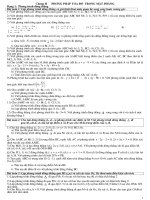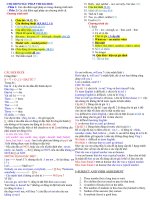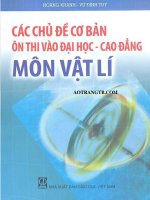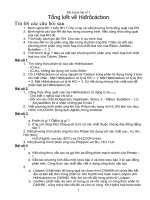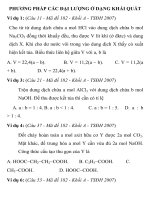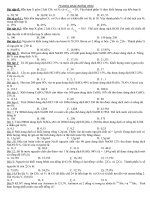Gián án Chu điểm ngữ pháp ôn thi đại học
Bạn đang xem bản rút gọn của tài liệu. Xem và tải ngay bản đầy đủ của tài liệu tại đây (104.41 KB, 2 trang )
CHU DIEM NGU PHAP THI DAI HOC
- Phần 1: Các chủ điểm ngữ pháp có trong chương trình mới.
- Phần 2: Các chủ điểm ngữ pháp của chương trình cũ.
Chương trình mới
1. Chia thì (10,12, 11)
2. Câu thường thuật (8,9,10,12, 11)
3. Câu bị động (8,9,10,12,11)
4. Câu điều kiện (10,12,11)
5. Mệnh đề quan hệ (10,12,11)
6. Because , because of – Athough , despite (10,12)
7. Mạo từ (10,12)
8. Modal verb – modal perfect (12)
9. So sánh (6,7,8,10,12)
10. Chia động từ trong ngoặc (10,11)
11. Rút gọn mệnh đề (11)
12. Thể nhấn mạnh (11)
13. Both- and, neither – nor, not only- but also (11)
14. Câu hỏi đuôi ( 9,11)
15. Mệnh đề chỉ mục đích
16. Tính từ 2 mặt
17. Too, so, either, neither (7)
18. Used to (9)
Chương trình cũ:
1. Style
2. To - too , enough, so – that, such – that
3. Có of có the
4. Chủ từ giả ( 3 cấp độ)
5. Whatever – no matter what
6. Đảo ngữ
7. Other- the other, another, others, other
8. Số ít số nhiều
9. No longer
10. Qúa khứ / hiện tại giả định
11. Thể sai bảo
CÂU HỎI ĐUÔI
Công thức :
S + V + O , [] + ĐẠI TỪ ?
Trong đó :
Đại từ : Lấy chủ từ câu đầu đổi thành đại từ
Đàn ông ---> he
Đàn bà ----> she
Vật (số ít ) --- -> it
There --- -> there
This --- -> it
That --- -> it
These --- -> they
Those --- -> they
Số nhiều ----> they
Các đại từ như : they, he she ... thì giữ nguyên
[] : nhìn ở câu đầu nếu có động từ đặc biệt thì chuyển thành []
nếu không có thì mựon trợ động từ do.does ,did
Những động từ đặc biệt có thể chuyển ra vị trí [] mà không cần
phải mượn trợ động từ là:
- is, am, are, was, were
- wil, would - can, could - may, might - should - had ( better)
- have, has, had ( + p.p) - lưu ý nếu phía sau không có p.p ( cột
3) thì không được xem là động từ đặc biệt
- Nếu câu đầu có NOT, hoặc các yếu tố phủ định như : never,
rarely, no, hardly ...., thì [] không có NOT, nếu câu đầu không có
NOT thì [] có NOT
NHỮNG DẠNG ĐẶC BIỆT :
I am ----> Aren't I ? ( nhưng nếu là : I am not ... thì lại dùng : am
I ? )
Let's ....--------> Shall we ?
Nobody, no one, everyone, everybody ...----> [] they ?Someone,
somebody -------------> [] he
- Câu mệnh lệnh ( không có chủ từ ) -------> Will you ?
VÍ DỤ :
Lan can go, can't she ? ( động từ đặt biệt đem can ra sau)
Tom likes it, doesn't he ? (không có động từ đặt biệt nên mượn
trợ động từ does )
the dogs won't run, will they ? ( câu đầu có not nên câu sau
không có not )
Go out with me, will you ? ( câu mệnh lệnh )
Don't take it, will you ? ( mệnh lệnh, dù có not hay không cũng
dùng will you )
I am a student, aren't I ?
CHU TU GIA
Cấp độ 1: ( chủ từ là : to inf, Ving và that clause)Ví dụ:
To learn English is difficult. ( chủ từ là to inf. )
Learning English is difficult. ( chủ từ là Ving )
That we can't go abroad is obvious. ( chủ từ là that clause ) => việc
mà chúng tôi không thể đi nước ngoài là hiển nhiên
Cấp độ 2: ( Dùng chủ từ giả :it )
Cách biến đổi từ cấp độ 1 qua cấp độ 2 là dùng chủ từ giả it thế
vào chủ từ thật rồi đem chủ từ thật ra phía sau:
It is difficult to learn English. ( đem chủ từ thật là cụm to inf. ra
sau rồi dùng chủ từ giả it thế vô làm chủ từ)
It is difficult learning English.
It is obvious that we can't go abroad.
Cấp độ 3: ( Dùng thêm động từ trước chủ từ giả it )
Để có cấp độ này ta thêm chủ từ : we, I ... và động từ : think,
consider, make, find, believe ... trước it, sau đó bỏ động từ to be đi,
các phần khác giữ nguyên ( mẫu này không dùng dạng Ving )
We think it difficult to learn English.
We think it obvious that we can't go abroad.
Như vậy các em cũng thấy là câu đề áp dụng cấp độ 3 dạng mệnh
đề that, thử viết lại câu đề cho ở các cấp độ nhé:
That she was a typical teacher was an honour.
It was an honour that she was a typical teacher. ( đem chủ từ thật
là mệnh đề that ra sau rồi dùng chủ từ giả it thế vô làm chủ từ)
Miss Joan found it was an honour that she was a typical teacher.
Miss Joan found it an honour that she was a typical teacher.
I>SUBJECT AND VERB AGREEMENT
1. Three months (be) a long time to wait.
2. Five dollars (be) too much to pay for that book.
3. A number of books (be) on the table.
4. The number of students in this class (be) limited to thirty.
5. Neither of the answers (be) correct.
6. Everybody (have) a good time.
7. Either your key or my key (be) missing.
8. John or his brothers (be) going to help me.
9. The author and lecturer (be) arriving today.
10. Jim and Joe (be) roommates.
11. The package of cigarettes (be) on the table.
12. Most of the members (be) happy.
13. Half of the students (be) looking out.
14. Some of the sugar (was/were) spilt on the floor.
15. There (be) plenty of time.
16. There (be) a lot of lakes.
17. My wife, not my friends,( is waiting/are waiting) for me.
18. Either the mayor or the eldermen (be) to blame.
19. Not John but his brothers (be) to blame.
20. Her principal anxiety (was/were) her children.
21. The girl, as well as the boys, (has/have) learnt to ride.
22. The bat together with the ball (was/were) stolen.
23. Three fourths of the wall (be) painted.
24. Two fifths of the members (be) present.
25. Two times two (make) four.
26. Two plus two (be) four.
27. Nine from fourteen (be) five.
28. Five dollars (be) a small sum.
“The three Musketeers” (be) written by Alexandre Dumas.
29. The number of new books in our library (be) ever
growing.
30. A number of new books in our library (be) displayed at
the book show.
31. There (be) a lot of traffic on this road.
II>Choose the corect answer in the parentheses
1. The weather in the southern states ( gets, get) very hot during the
summer.
2. The result of Dr. Noll’s experiment( was,were) published in
a scientific journal.
3. Bob and his friends( is,are) coming to the anniversary party
tomorrow night.
4. Every man, woman, and child (is,are) protected under the
law.
5. Washing the dishes (is, are) the children’ job
6. A lot of the students (is, are) already here.
7. Some of the furniture in our apartment (is, are) secondhand
8. Some of the desks in the classroom (is, are) broken.
9. At least three-quarters of that book on famous Americans (is,
are) about people who lived in the 19
th
century
10. One of the coutries I would like to visit (is, are) Italy.
11. Some of the cities I would like to visit (is, are) Rome and
Vience
12. Each student in the class (has, have) to have a book.
13. None of the students ( was,were) late today.
14. The United States (is, are) lacated in North America.
15. Economics (is, are) Don’s favourite subjects.
16. Ten minutes (is, are) more than enough time to complete this
exercise.
17. Most people (likes,like) to go to the zoo.
18. The police (is, are) coming. I’ve already called them.
19. Japanese (is, are) very difficult for English speakers to learn.
20. the Japanese (has, have) a long and interesting history.
21. The old in my country (is, are) cared for by their children
and grandchildren.
22. This exercise on singular- plural agreement of subjects and
verbs (is, are) easy.
23. The extent of Jane’s knowledge on various complex subjects
( astounds. Astound: lam kinh ngac) me.
24. The subjects you will be studying in this cource (is, are) listed
in the syllabus.
25. Only the black Widow spider, or all of the spiders in the
United States, ( has,have) caused death among human being.
26. Each girl and boy in the sixth- grade class( has,have) to do a
science project.
27. Getting to know students from all over the world (is, are) one
of the best parts of my job.
28. where ( do, does) your parents live?
29. Why ( was,were) Susan and Alex late the meeting?
30. (Is, are) having the respondsibility for taking care of pets good
for young children?
31. Some of the fruit in this bowl (is, are) rotten
32. Some of the apples in that bowl (is, are) rotten
33. Half of the students in the class (is, are) from Arabic-
speaking countries.
34. Half of this money ( belong, belongs) to you.
35. A lot of students in the class (is, are) from Southeast Asia.
36. A lot of clothing in those stores (is, are) on sale this week.
37. One of my best friends (is, are) coming to visit me next week.
38. Each boy in this class ( has,have) his own notebook.
III>Choose the corect answer in the parentheses
1. Every one of the students (is, are) required to take the final
test.
2. One of the chief materials in bones and teeths (is, are)
calcium.
3. ( Do, does) all of the children have their books?
4. ( Do, does) all of this homework have to finished by
tomorrow?
5. Why ( was,were) some of the students excutes from the
examination?
6. Why ( was,were) one of the students excutes from the
examination?
7. What percentage of the earth’s surface (is, are) covered by
water?
8. What percentage of the people in the world (is, are)
illiterate?
9. Massachutts (is, are) a state in the Northeastern part of the
United State.
10. Physics(seek,seeks) to understand the mysteries of the
physical world.
11. Statistics (is, are) a branch of mathematics
12. Fifteen minutes (is, are) maximum length of time allowed
for the exam.
13. Twenty dollars (is, are) an unreasonable price for the
necklace.
14. Many people in the world (do,does) not have enough to eat.
15. The poor (is, are) helped by government program
16. John, along with twenty friends (is, are) planning a party.
17. The picture of the soldiers (bring, brings) back many
memories.
18. The quality of these recordings (is, are) not very good.
19. Mr. Jones, accompanied(cung voi) by several members of
the committee, ( has,have) proposed some changes of the
rules.
20. Anything (is, are) better than going to another movie tonight.

